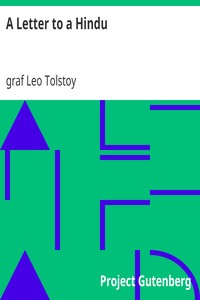A Letter to a Hindu by graf Leo Tolstoy
"A Letter to a Hindu" by Leo Tolstoy is a philosophical letter written in the early 20th century. This insightful piece reflects on the nature of oppression and the appropriate responses to it, stemming from Tolstoy’s profound moral and spiritual convictions. The book is essentially a treatise on nonviolence and love, presenting these concepts as essential for overcoming tyranny, particularly within the context of colonial India. In this letter, Tolstoy addresses the
plight of the Indian people under British rule, suggesting that true liberation will only come through the recognition of a universal law of love rather than through violent resistance. He critically examines the idea that external forces, such as the British, are to blame for the subjugation of the Indian masses; instead, he posits that the submission of the majority to a minority is rooted in self-inflicted inertia stemming from a lack of spiritual consciousness. Tolstoy’s arguments emphasize that nonresistance to evil, backed by profound love for humanity, can liberate individuals from their oppressors. Through this lens, he encourages Indians to abandon violent means of resistance, advocating for a transformation in moral and spiritual consciousness as the path to true freedom. (This is an automatically generated summary.)
Read now or download (free!)
| Choose how to read this book | Url | Size | ||||
|---|---|---|---|---|---|---|
| Read online (web) | https://sendtokindle.compellingsciencefiction.com/ebooks/7176.html.images | 65 kB | ||||
| EPUB3 (E-readers incl. Send-to-Kindle) | https://sendtokindle.compellingsciencefiction.com/ebooks/7176.epub3.images | 86 kB |
Send
to kindle email: |
|||
| EPUB (no images, older E-readers) | https://sendtokindle.compellingsciencefiction.com/ebooks/7176.epub.noimages | 84 kB | ||||
| Kindle | https://sendtokindle.compellingsciencefiction.com/ebooks/7176.kf8.images | 168 kB | ||||
| older Kindles | https://sendtokindle.compellingsciencefiction.com/ebooks/7176.kindle.images | 157 kB | ||||
| Plain Text UTF-8 | https://sendtokindle.compellingsciencefiction.com/ebooks/7176.txt.utf-8 | 53 kB | ||||
| Download HTML (zip) | https://www.gutenberg.org/cache/epub/7176/pg7176-h.zip | 83 kB | ||||
| There may be more files related to this item. | ||||||
Similar Books
About this eBook
| Author | Tolstoy, Leo, graf, 1828-1910 |
|---|---|
| Title | A Letter to a Hindu |
| Note | Reading ease score: 46.9 (College-level). Difficult to read. |
| Note | Wikipedia page about this book: https: //en.wikipedia.org/wiki/A_Letter_to_a_Hindu |
| Credits | Produced by Chetan Jain, and David Widger |
| Language | English |
| LoC Class | HM: Social sciences: Sociology |
| Subject | Evil, Non-resistance to |
| Subject | Government, Resistance to |
| Subject | National characteristics, East Indian |
| Category | Text |
| EBook-No. | 7176 |
| Release Date | Dec 1, 2004 |
| Most Recently Updated | Nov 26, 2012 |
| Copyright Status | Public domain in the USA. |
| Downloads | 688 downloads in the last 30 days. |
| Project Gutenberg eBooks are always free! | |

